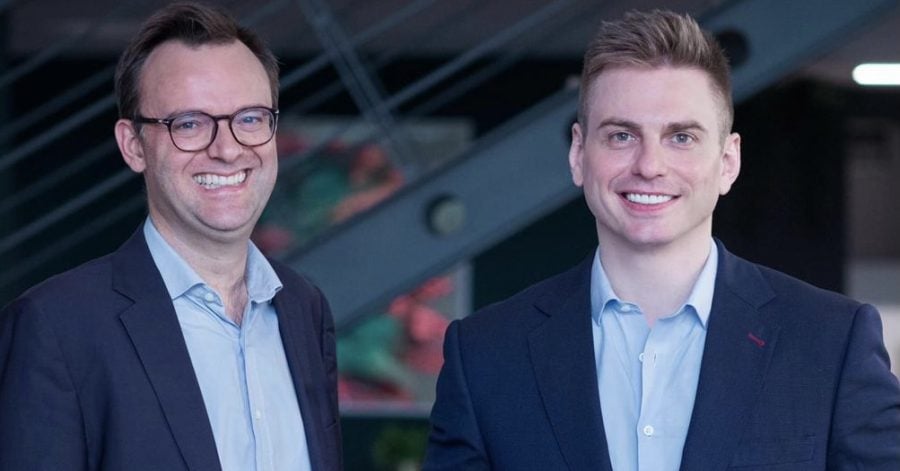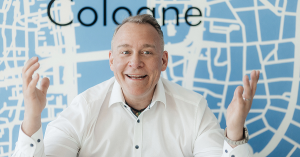Fenix.eco, the Romanian marketplace for refurbished mobile phones, announced its merger with the Recommerce Group, a European platform for pre-owned smartphones. After the merger, the Romanian company will change its name to Recommerce Devices & Solutions Romania.
The Recursive met with Gregoire Vigroux, the French CEO and co-founder of Fenix, and Augustin Becquet, the CEO of Recommerce, to discuss their merger, the potential of the market for refurbished phones, and the growth of the circular economy.
Gregoire Vigroux said that the Romanian startup decided to join forces with Recommerce because he felt they didn’t grow fast enough. He saw more value to tap into the potential of the market in Romania and the region in general together.
“We saw that the roots of Fenix and those of Recommerce were the same in terms of willingness to do good for the planet and the people. We discussed getting together as it would be faster to accelerate outside of Western Europe,” Augustin Becquet added.
Starting a business amidst the pandemic
Fenix was founded in April 2020, in Bucharest, Romania, amidst the coronavirus storm. The company has three co-founders – Gregoire Vigroux, Adrien Arnoux, and Hector Destailleur.
“When I launched the company, some of my friends told me: ‘Greg, are you crazy? This is the worst time ever to launch your startup. People are losing their jobs, staying at home, they aren’t buying anymore. Why are you launching?,’” Vigroux shared.
Vigroux is a Paris-born entrepreneur, who discovered the Romanian market back in 2006. In 2007, he developed his first successful company, CallPoint New Europe, now named TELUS International Europe, an outsourcing company in Eastern Europe, part of TELUS International.
The Recommerce Group, formerly Recommerce Solutions, has been on the market for more than a decade. Back in 2009, the company was a pioneer of buyback, refurbishment, and sales of second-hand smartphones.
Its mission is to fight against waste, make technology accessible to the greatest number of people, and become the leading distribution brand for refurbished smartphones in Europe.
The Recommerce Group was founded by Antoine Jeanjean, Benoit Varin, Cedric Maucourt, and Pierre-Etienne Roinat.
According to Recommerce’s Sustainable Development Report, since the beginning, the company has had €220M in cumulative revenue. They have also raised capital of €60M in the past decade. Their first international expansion was in the Czech Republic.
The report states that Recommerce has collected 2.7M mobile phones, and 97% of the collected products are repackaged and remarketed. This saved 108,000 tonnes of raw materials and 81,000 tons of CO2. The report details that the manufacturing stage accounts for 80% of a phone’s carbon footprint and a reconditioned smartphone can save up to 30 kg Eq Co2 over its entire life cycle.
Augustin Becquet, the CEO of Recommerce, has two decades of experience in IT, Telecom, Smart Home, AR, VR, consumer electronics, and green tech. He began working for the Recommerce Group in 2019 as COO. He is also the president of the European Refurbishment Association EUREFAS, which aims to ensure that companies bring the right quality to customers with an industry certification.
Room to grow: 10% market share and €10M revenue
Vigroux explains that there are 5M phones sold in Romania every year. Тhey aim to reach 1% of this market this year and 10% in the following years. “We are going to add more people here in Romania. The target is to reach Є10M in the next three years. The growth is going to be fast,” Becquet adds.
Bequet continues to explain that they aim to have a footprint in Romania but to also expand to nearby markets because they believe there is an interest from customers. First on the map for expansion is Bulgaria.
They target young, urban people, price-sensitive, but also caring about their impact on the climate. “We’re aiming for 30% of adoption rates in the region, keeping in mind that the Eastern Europeans tend to be more price-driven than in other regions across the continent,” Vigroux says. He adds that their primary objective is to grow and increase their revenue, but also to have an impact on society.
For this reason, they are actively looking for new distribution channels in the region and believe they are reaching the market at the perfect time. “The education phase was easier and accelerated by the fact that we deployed retail. We have a big focus on retail, no longer online, and of course marketplaces,” concludes Vigroux.
Here’s what else they shared with The Recursive:
The Recursive: Tell us about the beginning of Fenix.
Gregoire Vigroux: Two years ago, I saw a fascinating article about the refurbished mobile phones market in a French business magazine. I heard about Recommerce for the first time and I thought that’s a very good business because 15% of the phones sold in Germany and France are refurbished. It’s a business with an impact because manufacturing a new phone is a catastrophe for the environment. It requires lots of CO2 and rare materials.
What do you believe made Fenix stand out on the market and get acquired one year after the launch?
GV: I would say we are a strong brand with a giant methodology when it comes to distribution. The product is very important, the team is crucial, the timing is almost everything, but there is also a bit of luck.
I’m a very bullish type of entrepreneur, which makes it risky because we can fail. However, the bigger the risk, the bigger the outcome created in times of crisis. From launch to the exit, it took 14 months, but more like 3 years total.
I wouldn’t change anything, but it’s easy to say it because I got lucky. If I had gone bankrupt, I would not have been here to brag. So, I think that I need to still keep a certain level of humility because, at the European level, 70%-90% of tech startups fail. We are not a tech startup. We sell tech products; we are an intermediary.
Augustin Becquet: The pandemic was an accelerator. It’s more difficult to travel, to do business, and having a local team was exactly what we were looking for. I think the ability of companies to integrate other companies is essential for growth.
What was 2020 like for the Recommerce Group?
AB: Because some shops were closed, it was more difficult to buy back devices and there were also fewer purchases of new devices. The whole market was growing slower than usual. It grew around 9% last year at a worldwide level. But in Europe, it was more, depending on the country, between 10% and 20%. Recommerce outgrew the market, having a growth of 40%. It’s a very dynamic market for us at least.
How do you see the refurbished phones market developing in the next few years?
AB: The market for new smartphones is decreasing, so there is a clear path to going greener on the big front. Price and sustainability are the two main growth drivers. It’s good for the economy, for trade, jobs, and the environment.
The European Union is going to push to ensure that we’re transforming our industry with the European Union’s Green Deal, a €1B investment into this transformation. We think that the circular economy is essential for Europe because we don’t have any high-tech industry, everything is coming from Asia.
We’re taking back the devices. We’re transforming the devices and giving back the products to the market, but also, each time that we’re buying back the phone, we’re giving back money to people. It’s a good trade balance for jobs and scaling through clear impact.
What are the challenges ahead for the circular economy?
GV: Whenever you’re a pioneer in a new business, it comes with a first-mover advantage and a disadvantage. You can capitalize on building a reputation and a strong brand to close deals with big partners. But you need to educate the consumers. The best way to do it was to launch retail.
For consumers to be introduced to refurbished devices, you burn cash, and you burn time. We knew that we had to go through it and together with Recommerce we are still in this educational phase.
Launching Fenix in Romania, we had to explain: “No, Fenix smartphones are not new, but they are not peer-to-peer second-hand type. It’s like new, but it has been pre-owned. Yet, even though it has been pre-owned, it has been refurbished, so it comes with a 12-month guarantee.”
AB: Adoption is the key challenge for us. There are also industrial challenges, ensuring that the products can be repaired easily. Cheap smartphones, that you can buy for 100-250 euros, are impossible to repair because it’s difficult to find spare parts. We hope, in terms of the vision for our industry, that the manufacturers of new phones build products that are going to last longer and that are easier to repair and not stop working after two years.







